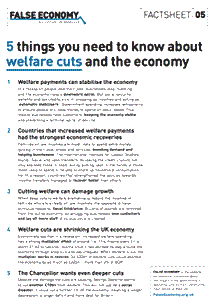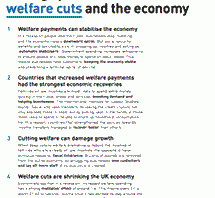1. Welfare payments can stabilise the economy
 In a recession people lose their jobs, businesses stop investing and the economy risks a downward spiral. But social security, benefits and tax credits kick in, propping up incomes and acting as ‘automatic stabilisers’. Government spending increases temporarily to ensure people still have money to spend on basic needs. This means businesses have customers, keeping the economy stable and preventing a terminal spiral of decline.
In a recession people lose their jobs, businesses stop investing and the economy risks a downward spiral. But social security, benefits and tax credits kick in, propping up incomes and acting as ‘automatic stabilisers’. Government spending increases temporarily to ensure people still have money to spend on basic needs. This means businesses have customers, keeping the economy stable and preventing a terminal spiral of decline.
2. Countries that increased welfare payments had the strongest recoveries
Families on low incomes are most likely to spend extra money quickly in their local shops and services, boosting demand and helping businesses. The International Institute for Labour Studies found: ‘Social and cash transfers [following the credit crunch] not only assisted those in need, but by putting cash in the hands of those most likely to spend it, helped to shore up household consumption. For this reason, countries that strengthened the policies towards income transfers managed to recover faster than others.’
3. Cutting welfare can damage growth
When deep cuts to welfare dramatically reduce the incomes of families who are already on low incomes, the opposite of fiscal stimulus happens: fiscal hindrance. Billions of pounds are removed from the active economy, so struggling businesses lose customers and lay off more staff. A vicious cycle is created.
4. Welfare cuts are shrinking the UK economy
Economists say that in a recession, increased welfare spending has a strong multiplier effect of around 1.6. This means every £1 is worth £1.60 to national income once it has worked its way around the economy through shop tills and pay cheques. When welfare is cut, the multiplier works in reverse. So £20bn of welfare cuts could depress the economy by as much as £32bn – more than 2% of GDP.
5. The Chancellor wants even deeper cuts
Despite the damage the cuts are causing, George Osborne wants to cutanother £10bn from welfare. This will not just be a social disaster, it could cut a further 1% off the economy, meaning a longer depression, a larger deficit and more debt for Britain.
- Posted by: False Economy at 11:53am on 7 September 2012
- Filed under: Benefits, Economy



2 Responses
please sir can i have some more jeff3 who is out of time with his time limited by this starving lot jeff3
When your engines are spluttering you don’t cut them off, you give them more fuel.